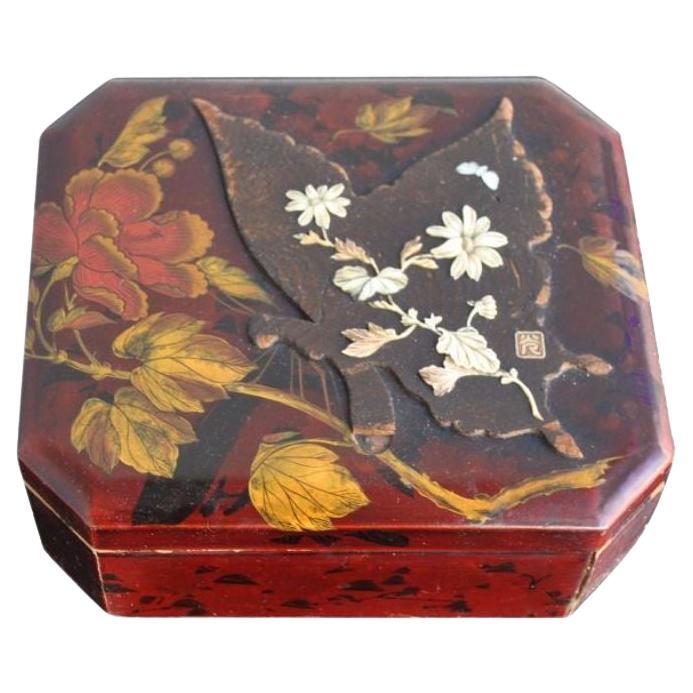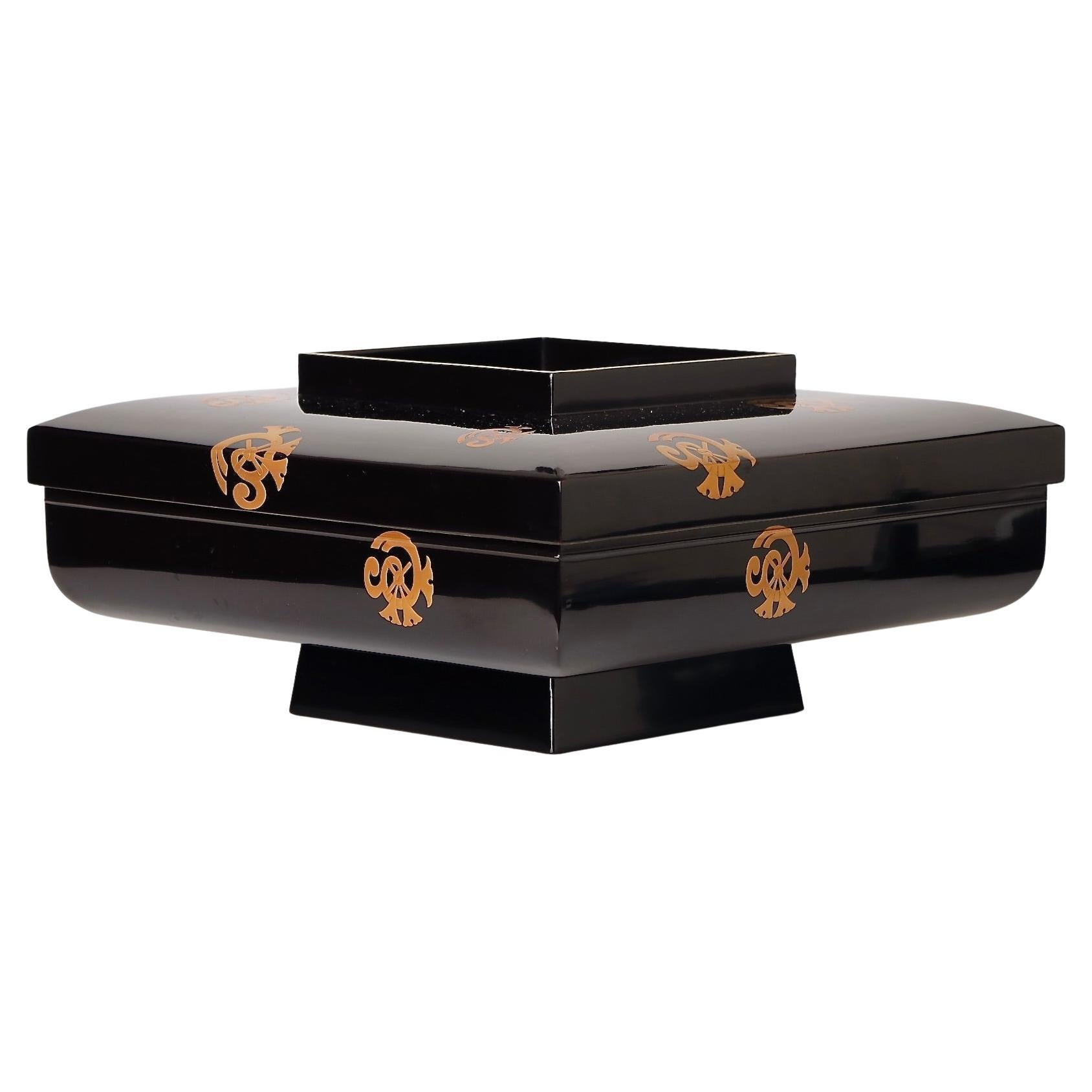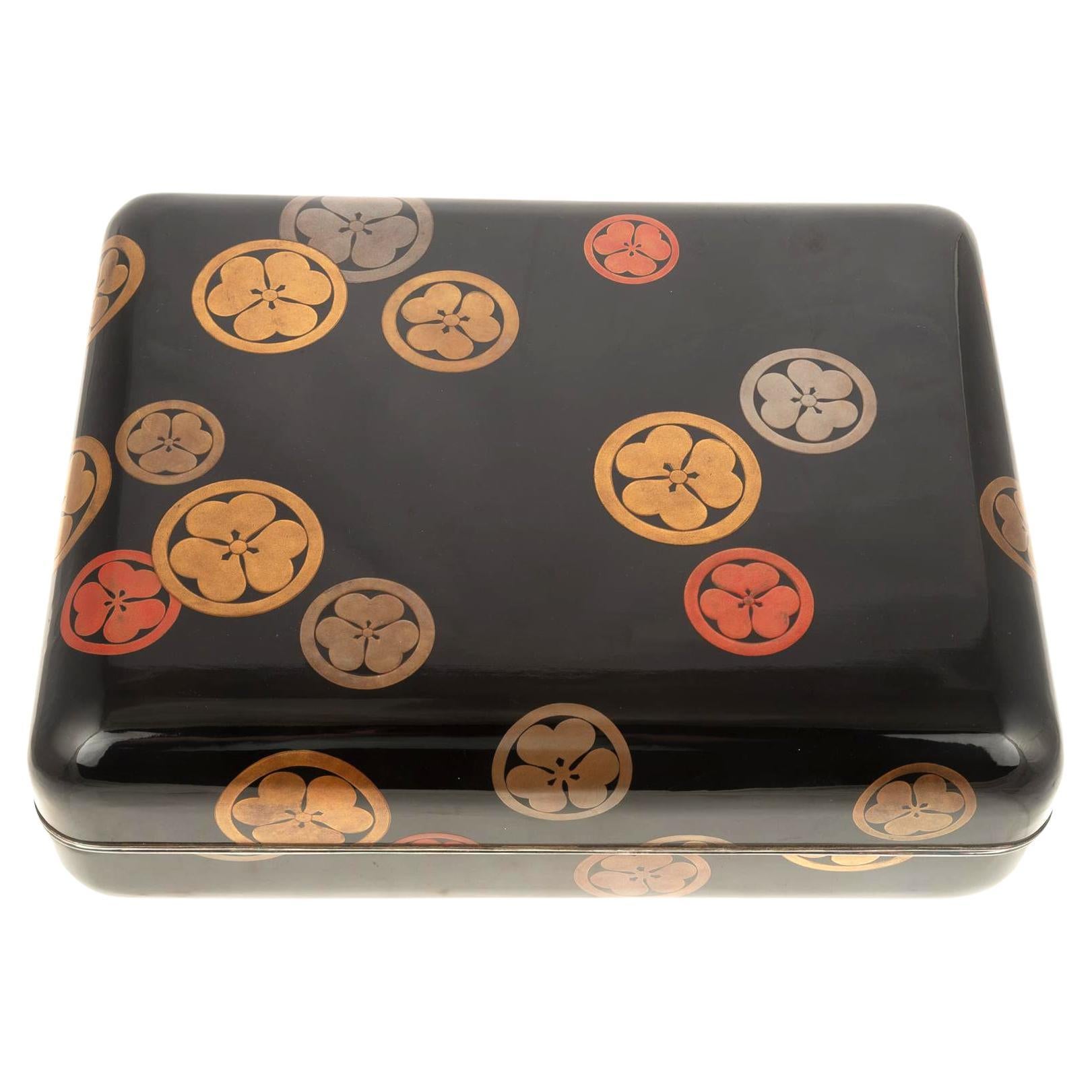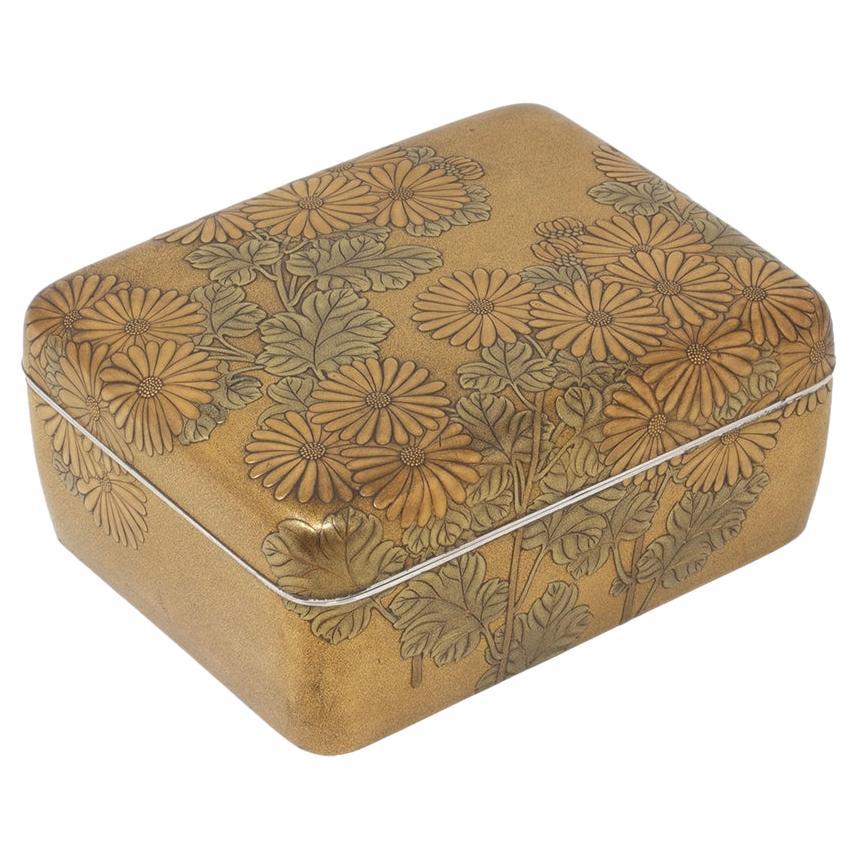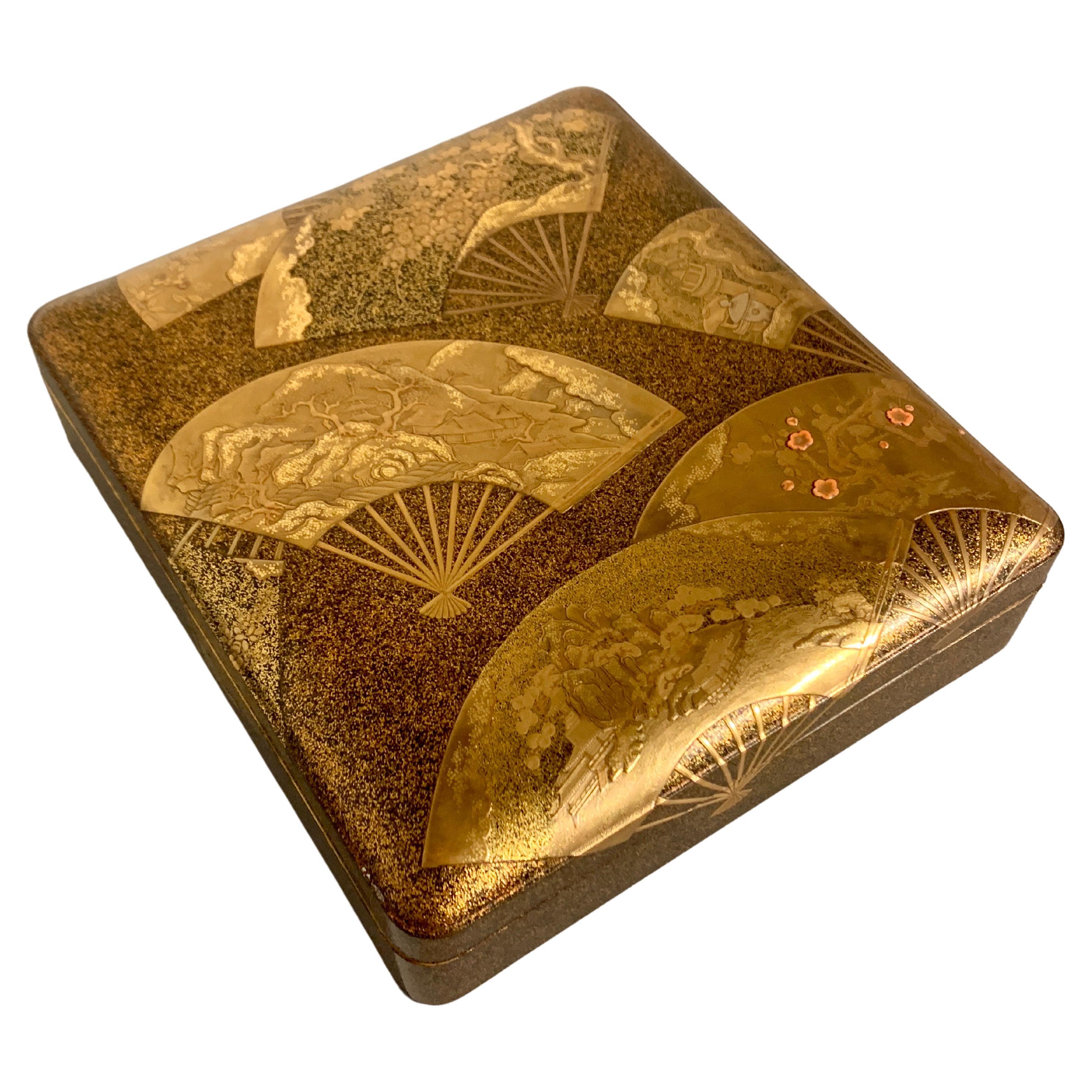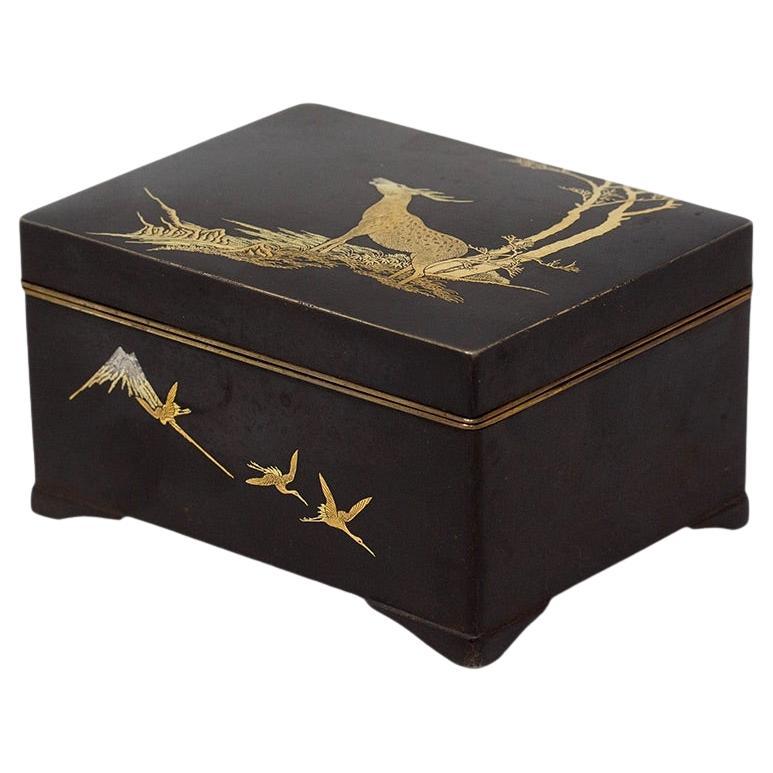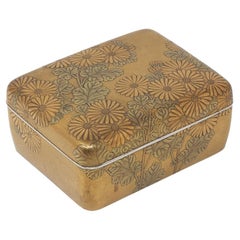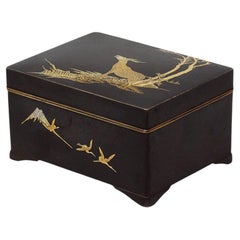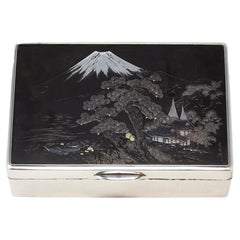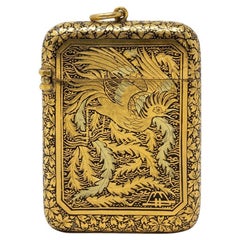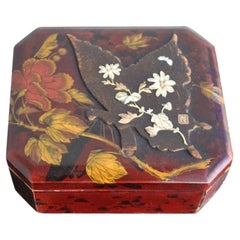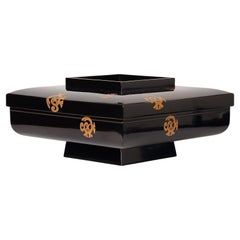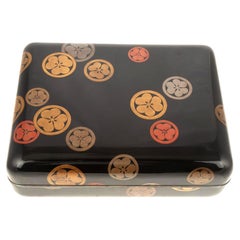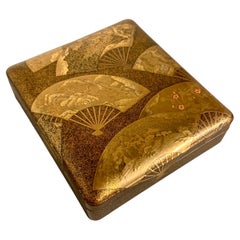Items Similar to Antique Japanese Meiji Period Tsuba Decorated Box and Dish by Fujii Yoshitoyo
Want more images or videos?
Request additional images or videos from the seller
1 of 20
Antique Japanese Meiji Period Tsuba Decorated Box and Dish by Fujii Yoshitoyo
$3,087.23
£2,250
€2,650.70
CA$4,246.64
A$4,730.67
CHF 2,495.35
MX$57,360.80
NOK 31,744.48
SEK 29,571.99
DKK 19,793.80
About the Item
Original Box and Dish Pair
From our Japanese collection, we are pleased to offer this Japanese Komai Style Box and Dish Fujii Yoshitoyo. The Box of slim rectangular shape seated upon the original matching dish. The Komai Style Box beautifully decorated with an unusual composition of Japanese Tsuba’s with various decoration surrounded by blossoming flowers. Each Tsuba contains its own design including cherry blossom, bamboo and crane birds. The Komai Style Box sits upon the original presentation dish which is decorated with matching design and engraved ‘With The Compliments of J. Konishi’ and is signed to the base with the Yoshitoyo mark (美豊作) above the Fujii mark used by the company. The Komai style box and dish date to the Meiji Period (1868-1912) and the late 19th century circa 1895.
Tsuba is a Japanese term for the area of a sword that is part of a sword mounting and the hand guard. It is mounted between the sword’s blade and grip to protect the user’s hands.
Fujii Yoshitoyo was born in Kyoto, Japan in 1868. Fourth generation metal worker of first rank. He devoted himself to learning about the damascene art and developing the already known techniques used by his family. He left home and moved to Tokyo to develop further and at the age of 35 in 1902 he obtained a patent for his new techniques from the imperial government. In 1909 a second patent was granted to him, he continued to develop his skills and was awarded multiple first class medals throughout his exhibitions and was fortunate enough to sell directly to the imperial household. At its highest point the Fujii factory employer over 200 people mainly exporting sought after objects to Europe and America. During this time he also had his works represented by the Mitsukoshi company. Unlike Komai who use the Zogan (inlay) technique Fujii uses mostly an etching technique on his works.
Meiji Period was an era of Japanese history that spanned from 1868 to 1912. It was the first half of the Empire of Japan, when the Japanese people began to build a paradigm of a modern, industrialised nation state and emergent great power, influenced by Western countries and aesthetics. As a result of radically different ideas, the changes to Japan were profound and it affected the social structure, politics, economy, military, and foreign relations across the board. The period corresponded to the reign of Emperor Meiji and was preceded by the Keio era and was succeeded by the Taisho era.
Cultural Art during the Meiji Period was of particular interest to the government and they overhauled the art export market which in turn promoted Japanese arts via various world’s fairs, beginning in Vienna at the world fair in 1873. The government heavily funded the fairs and took an active role organising how Japan’s culture was presented to the world including creating a semi-public company named Kiritsu Kosho Kaisha (First Industrial Manufacturing Company). The Kiritsu Kosho Kaisha was used to promote and commercialise exports of Japanese art and established the Hakurankai Jimukyoku (Exhibition Bureau) to maintain quality standards. For the 1876 Centennial International Exhibition in Philadelphia, the Japanese government created a Centennial Office and sent a special envoy to secure space for the 30,000 items that would be displayed. The Imperial Household also took an active interest in arts and crafts, commissioning works by select artists to be given as gifts for foreign dignitaries further emphasising the high quality and importance of Japanese art. Just before the end of the 19th century in 1890, the Teishitsu Gigeiin (Artist to the Imperial Household) system was created to recognise distinguished artists. These artists were selected for their exceptionally high quality wares and talent in their own industry. Over a period of 54 years Seventy artists were appointed, amongst these were ceramicist Makuzu Kozan and cloisonné enamel artist Namikawa Yasuyuki.
Measurements Box 3.5cm High x 9.5cm Wide x 8cm Deep – Tray 1cm High x 13cm Wide x 11cm Deep ( 1.4 x 3.75 x 3.15 – 0.4 x 5.1 x 4.3 Inches)
- Creator:Fujii Yoshitoyo (Maker)
- Dimensions:Height: 1.78 in (4.5 cm)Width: 5.12 in (13 cm)Depth: 4.34 in (11 cm)
- Style:Meiji (Of the Period)
- Materials and Techniques:
- Place of Origin:
- Period:
- Date of Manufacture:Circa 1895
- Condition:Wear consistent with age and use.
- Seller Location:Newark, GB
- Reference Number:Seller: JKRDW1stDibs: LU6971245586682
About the Seller
5.0
Gold Seller
Premium sellers maintaining a 4.3+ rating and 24-hour response times
Established in 2019
1stDibs seller since 2022
37 sales on 1stDibs
Typical response time: 2 hours
- ShippingRetrieving quote...Shipping from: Newark, United Kingdom
- Return Policy
Authenticity Guarantee
In the unlikely event there’s an issue with an item’s authenticity, contact us within 1 year for a full refund. DetailsMoney-Back Guarantee
If your item is not as described, is damaged in transit, or does not arrive, contact us within 7 days for a full refund. Details24-Hour Cancellation
You have a 24-hour grace period in which to reconsider your purchase, with no questions asked.Vetted Professional Sellers
Our world-class sellers must adhere to strict standards for service and quality, maintaining the integrity of our listings.Price-Match Guarantee
If you find that a seller listed the same item for a lower price elsewhere, we’ll match it.Trusted Global Delivery
Our best-in-class carrier network provides specialized shipping options worldwide, including custom delivery.More From This Seller
View AllImportant Japanese Lacquer Presentation Box Gifted by Japanese President to RAF
Located in Newark, England
PRESENTED BY THE 21ST PRESIDENT OF JAPAN
From our Japanese collection, we are absolutely delighted to bring to market this Important Japanese Lacquer Presentation Box. The Presentat...
Category
Early 20th Century Japanese Art Deco Lacquer
Materials
Lacquer
Japanese Meiji Period Damascene Box by Ashizuki with Gold and Silver
Located in Newark, England
INLAID WITH A GOLD AND SILVER DEER
From our Japanese collection we are pleased to offer this Japanese Damascene Box by Ashizuki. The Japanese Box of re...
Category
Antique 19th Century Japanese Meiji Metalwork
Materials
Gold, Silver, Brass, Iron
Japanese Meiji Period Silver and Mixed Metals Cigar Decorative Box by Hidekuni
Located in Newark, England
From our Japanese collection, we are delighted to introduce this Japanese Silver and Mixed Metals Box by Hidekuni. The Japanese Box of large rectangular form lined in a dark asian ro...
Category
Antique Early 1900s Japanese Meiji Cigar Boxes and Humidors
Materials
Gold, Silver
Japanese Antique Meiji Period Vesta Case by Fujii Yoshitoyo
By Fujii Yoshitoyo
Located in Newark, England
DEPICTING A MYTHICAL HO-O PHOENIX
From our Japanese collection, we are delighted to offer this Japanese Vesta Case by Fujii Yoshitoyo. The Vesta Case extensively decorated with gol...
Category
Early 20th Century Japanese Meiji Tobacco Accessories
Materials
Gold Plate, Brass
Japanese Antique Meiji Period Hammered Silver Dragon Box
Located in Newark, England
Hammered Silver Decoration
From our Japanese collection, we are pleased to offer a Japanese Meiji Period Silver Dragon Box. The box of rectangular f...
Category
Antique Late 19th Century Japanese Meiji Sterling Silver
Materials
Silver
Japanese Meiji Period Cloisonne Enamel Koro Tsukamoto Hikokichi
By Tsukamoto Hikokichi
Located in Newark, England
Silver Mounted
From our Japanese collection, we are thrilled to offer this Japanese Cloisonne Enamel Koro by Tsukamoto Hikokichi. The Cloisonne Enamel Koro of exceptional quality sh...
Category
Early 20th Century Japanese Meiji Metalwork
Materials
Metal, Enamel
You May Also Like
Antique Japanese Lacquer Jewelry Box Towards the End of the 19th Century
Located in Marseille, FR
Antique Japanese lacquer jewelry box from the late 19th century decorated with flowers and foliage, 8 cm high for a length of 21 c...
Category
Antique Late 19th Century Jewelry Boxes
Materials
Lacquer
Uniquely Shaped Lacquer Box with Tachibana Clan Crests – 19th Century
Located in Fukuoka, JP
An impressive and unusually shaped Japanese lacquered box, bearing the gold crests of the prestigious Tachibana samurai clan. This elegant piece dates to the late Edo to early Meiji ...
Category
Antique 19th Century Japanese Edo Lacquer
Materials
Wood, Lacquer
1920s Large Japanese Maki-E Lacquer Box With Creeping Wood Sorrel Mon Crest
Located in Sheridan, CO
Large Japanese Maki-E Lacquer Box With Creepy Woodsorrel Mon or Kamon.
Circa 1920s, black exterior ground various mixed color mon of the Tokugawa Shogunate, silvered metal rim on the...
Category
Vintage 1920s Japanese Edo Decorative Boxes
Materials
Gold Leaf
Japanese Maki-e Lacquer Document Box, Edo Period, early 19th Century, Japan
Located in Austin, TX
A spectacular Japanese maki-e lacquer lidded box, possibly a writing box, suzuribako, decorated with images of folding fans, ogi, Edo Period, earl...
Category
Antique Early 19th Century Japanese Edo Lacquer
Materials
Coral
Japanese Meiji Period Antique Lacquer Box with Gold Maki-e Decoration
Located in New York, NY
A fine antique Japanese Meji Period lacquer box decorated with a fan and a stylized star shaped window in the maki-e technique. The fan at the top right corner, fully opened depictin...
Category
Antique 19th Century Japanese Meiji Lacquer
Materials
Lacquer
Lovely Antique Meiji Period Japanese Lacquer Box, 19th Century
Located in Amsterdam, Noord Holland
Lovely 19th c Antique Meiji Period Japanese Lacquer box.
Additional information:
Material: Lacquer
Region of Origin: Japan
Period: 19th century, 20th century
Japan Dynasty Period: M...
Category
Antique 19th Century Japanese Meiji Decorative Boxes
Materials
Lacquer
More Ways To Browse
Emperor Japan
Japanese Metal Flower
Military Box
New Art Wares
Japanese Sword Furniture
Centennial Furniture
Empire Furniture Company Antique
Antique Box Seat
Japanese Meiji Period Box
Mounted Sword
Cherry Blossom Design
Sword Box
Japanese Metal Box
Metal Inlay Box
Antique Furniture Tokyo
Sword Display
Empire Vienna
Centennial 1876
